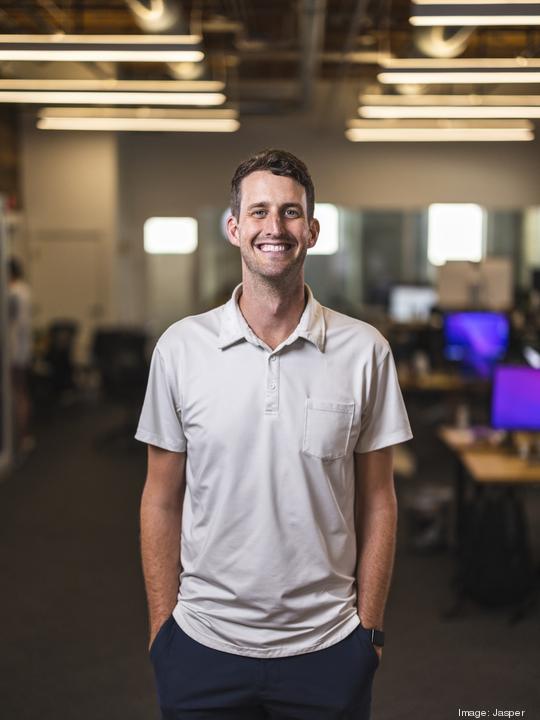
Welcome to The National Beat powered by American Inno, a weekly look at the startup fundings, profiles, analysis and other news you need to know from 40+ cities across the U.S. Want more stories like this in your inbox? Sign up for our future national newsletter from American Inno.
The Big One: An AI unicorn is born in less than two years
In less than 24 months since its launch, Austin startup Jasper has grown to a valuation of $1.5 billion after raising $125 million this week for its artificial intelligence platform. The startup uses AI to make digital content like marketing, blogs and other advertising material, along with birthday cards and even children's books.
It's among the fastest startups ever to reach a unicorn valuation, Austin Inno reports, and it's the latest example of one area venture capital investors are willing to open up their checkbooks for in 2022: AI.
Jasper is working in an emerging space known as generative AI, where technology creates new content rather than simply analyzing something that already exists. One of the most prominent use cases of this technology is DALL-E, artificial intelligence from startup OpenAI that creates images from text. At Jasper, the startup is tackling content marketing with its platform that lets users describe what they want Jasper to write, and the AI generates blogs, website copy, social media posts and other material.
Jasper, which sells subscriptions starting at $40 a month, now has more than 70,000 subscribers and 150 employees.
While Jasper's AI content is already being widely used, don't expect it to replace human writers anytime soon. Co-founder Dave Rogenmoser said the AI is great at getting a first draft assembled, the type of work that might help a junior writer. But, he said, people are still at the core of creating content.
"I'm sure we're going to look back in a year and just laugh at how terrible Jasper is. This is the worst it'll ever be, and it's pretty good," he said. "But yeah, we're going to see more and more breakthroughs here."
Startups to Watch
- Solestial, a Tempe, Arizona-based company that makes solar panels to be used in outer space, recently closed a $10 million seed round led by Airbus Ventures. Solestial says it can build its solar panels at 10% of the cost of those widely used in the satellite industry. The technology involves ultra-thin silicon voltaic panels optimized for space with at least 10 years of low-earth-orbit reliability.
- Boston startup Nix is a consumer diagnostic company that makes single-use, wearable patches that analyzes athletes’ sweat. The patches can tell them when, what and how much to drink by looking at fluid and electrolyte levels. The startup has landed several high-profile hires recently, including a strength and conditioning coach for the New York Giants and the former head of U.S. marketing at Reebok.
- Buffalo, New York-based startup Went creates custom commemorative souvenir tickets printed for people to save. The startup has partnered with the Buffalo Bills, and tested the concept during the Jan. 15 Buffalo Bills-Patriots Wild Card game. The idea is to create a replacement keepsake for printed tickets now that most fans get into sporting events with their phone.
- Redi.Health, a Columbus startup making a free tool for patients to manage chronic illnesses, raised $3.7 million in new funding. The startup's app replaces the manual processes of tracking medications, symptoms and steps in a treatment regimen. It counts pharmaceutical manufacturers like GoodRx and ScriptDrop among its customers.
- Houston-based VoltaGrid, a microgrid energy startup, raised $150 million in equity funding. VoltaGrid was founded in 2020 to develop microgrids from natural gas engines, portable energy storage, gas processing services and electric grid power connectivity.
- L.A. startup Renee has developed a personal health care assistant that takes care of common cumbersome, routine tasks for seniors, like refilling prescriptions and calling doctors offices. The startup raised more than $8 million in seed funding.
- Miami startup Brave Health, a telehealth provider focused on serving Medicaid populations, raised $40 million in Series C funding. The startup offers virtual outpatient services for mental health and addiction treatments, an alternative to traditional in-person services.
- NBA player Ben Simmons and Philadelphia Phillies' part-owner John Powers Middleton are part of a group launching a new sports training app out of Philadelphia.The startup, called TrainingHub, emerged from stealth this week and aims to connect trainers with people looking to improve their workout routine.
- Pittsburgh-based Gecko Robotics scored a major partnerships in a collaboration with Siemens Energy’s European Field Service organization. Gecko will work with Siemens Energy to deploy its robots for inspection and maintenance tasks on critical infrastructure throughout Europe.
- Seattle point-of-sale startup Cheq raised $13.3 million in new funding. The startup is meant to be a more active version of point-of-sale systems like Square and Toast. The company helps businesses attract customers by alerting nearby consumers about deals and coupons, and it will tell consumers inside stadiums which nearby bars and restaurants will still be open after an event.
- Storage Scholars, founded in 2017 at Wake Forest University, landed a deal on Shark Tank last week when Mark Cuban agreed to a 10% stake in the business in exchange for a $250,000 investment. It's designed as a pickup and delivery storage specifically designed for college students. Students receive boxes and packing supplies, pack up their items and Storage Scholars takes care of the rest.
A mega deal to watch: A $4.6B cybersecurity acquisition in Tampa
The $4.6 billion acquisition of cybersecurity firm KnowBe4 to Vista Equity Partners is among the largest corporate deals in Tampa Bay history, and a major boost to the city's emerging tech scene, Tampa Bay Inno reports. KnowBe4 went public in April 2021. But with the reversion back to a private entity, it is also expected to create the type of equity previously only seen in startup hubs like Silicon Valley and Boston. the KnowBe4 deal is said to be “without question” one of the biggest deals in the region in recent history.
FedEx rolls back its delivery robot
In early 2019, FedEx executive Brie Carere unveiled Roxo on The Tonight Show Starring Jimmy Fallon, where the plucky same-day delivery bot delivered a pizza to the late-night talk show host. The next day, the company further detailed the bot’s potential, hailing it as an efficient, eco-friendly way to handle the last leg of delivery, and naming Lowe’s, Pizza Hut, Target, Walgreens, Walmart and AutoZone as initial partners.
But years after the Fallon debut, FedEx has stopped its work on Roxo, Memphis Inno reports. The news comes as Amazon announced it's scaling back its own delivery robot platform.
Word on the street: Fundraising is 'hard as hell'
Raising money for your startup is "hard as hell right now,” Jason Caplain, co-founder of Durham, North Carolina-based Bull City Venture Partners, said, according to Triangle Inno. “If you’re a quality company and you’ve got an incredible team and strong economics … you’re able to get capital and, not only that, but if the competition to get in the deal is super fierce,” he said. But if you’re what he calls an “A minus or B company,” the capital has “frozen up.” Investors are “taking their sweet time right now and they can because as they wait, the markets continue to crater.”
Weird and wired: Kombucha startup too boozy?
A North Carolina kombucha startup’s latest challenge? A lawsuit claiming it’s too boozy for underage consumers. Multiple plaintiffs have teamed up to propose a class-action complaint against Cary-based kombucha brand Tribucha, alleging it contains double the alcohol that's allowed, and that it’s breaking federal and state law by not classifying its fermented teas as alcoholic beverages.
The lawsuit claims the drinks have as much alcohol as a standard beer — and are dangerous to unknowing consumers.




